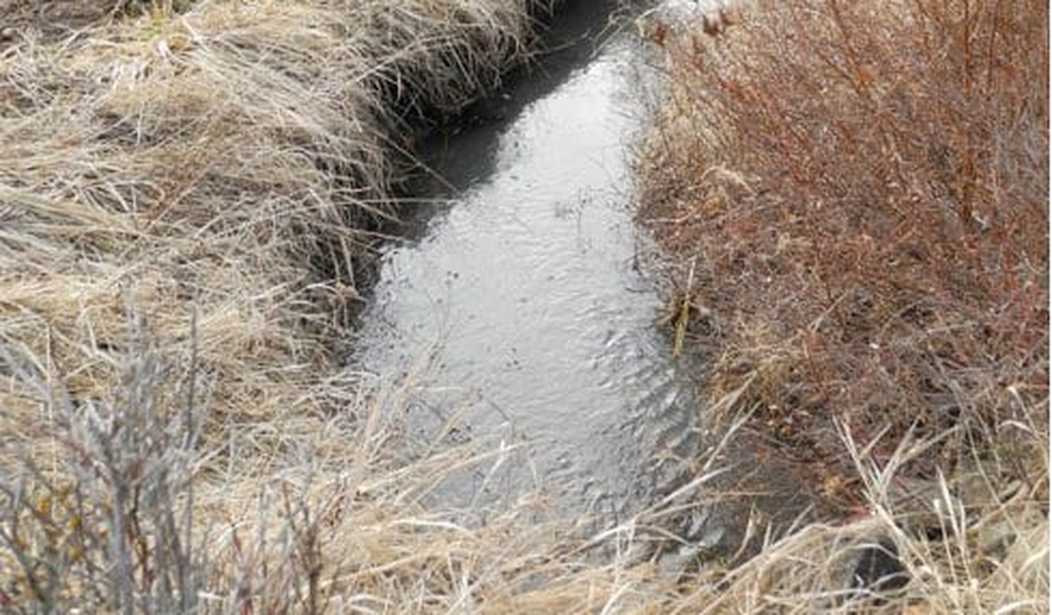WASHINGTON — Senate Republicans launched a legislative effort to try to block the Environmental Protection Agency from issuing final “onerous” regulations that would expand its jurisdiction in the Clean Water Act to even include ponds and ditches on private property.
In March, the EPA began a “robust” 90-day “outreach effort” to gather input in shaping a final rule, maintaining that the directive isn’t groundbreaking but a clarification effort needed to clearly define streams and wetlands protection after Supreme Court decisions in 2001 and 2006.
Critics, though, charged that the administration embarked on an unprecedented breach of private property rights without scientific basis.
The EPA wants to cover “most” seasonal and rain-dependent streams, which account for about 60 percent of stream miles in the country, arguing they have “a considerable impact on the downstream waters.”
Wetlands “near rivers and streams” would be protected under the CWA, and “other types of waters [that] may have more uncertain connections with downstream water and protection will be evaluated through a case specific analysis of whether the connection is or is not significant.”
Overall, the EPA stated at the time of its rulemaking announcement, a third of waters in the U.S. don’t meet Clean Water Act standards.
Last week, 30 senators introduced the Protecting Water and Property Rights Act of 2014, a bill “to preserve existing rights and responsibilities with respect to waters of the United States.”
It would block the EPA and the U.S. Army Corps of Engineers from finalizing the March proposed rule.
“The EPA’s proposed water rule is another blatant overreach into Americans’ private lives and property by the Obama Administration. Not only would it have a devastating impact on Missouri farm families, it would also inflict serious harm on productive activities like the construction of homes, businesses, roads, and even the development of energy,” said Sen. Roy Blunt (R-Mo.).
Sen. Johnny Isakson (R-Ga.) stressed that the EPA “wants to regulate not just ‘navigable’ waters, but every water.”
“This is yet another overstep by the administration that will harm not only landowners but our entire agriculture industry in Georgia,” Isakson said.
His Georgia counterpart, GOP Sen. Saxby Chambliss, said “landowners have dealt with overreaching federal regulations for too long and this latest move by the administration claiming they are ‘helping’ farmers and landowners is outrageous.”
The bill has scored an endorsement from the American Farm Bureau Federation, which said the EPA proposal “raises serious questions.”
“As a constitutional matter, the agencies are asserting an authority not granted them by Congress; in fact, the Chairman of the House Committee on Transportation recently called for bipartisan support to prevent Congress from ceding such authority to the agency,” said the Farm Bureau. “As a practical matter, it will mean increased enforcement against farmers, greater expenses for permitting, potential delays in managing their operations, and the unquestioned exposure of legal liability attendant with lawsuits from activists.”
The EPA could get stopped by Senate action if last year’s Water Resources Development Act (WRDA) debate is a guide: 52 senators backed an amendment prohibiting a similar effort by federal agencies to expand their jurisdiction.
The House Natural Resources Committee held a hearing today on “New Federal Schemes to Soak Up Water Authority,” including the proposed “waters of the U.S.” regulation.
“Many geologic and man-made water related features common to the arid West, including ditches, dry arroyos, washes, and ephemeral streams that flow only in response to agricultural return flows or infrequent storm events will now become subject to federal jurisdiction and permitting,” Larry Martin of the National Water Resources Association testified.
Rodger Clark of the Associated Electric Cooperative, Inc., told the committee they’re concerned that “transmission rights of way may be considered waters of the U.S.”
“Transmission rights of way are often simple ditches alongside roads. These ditches receive road runoff, which could grow cattails even though they infrequently hold water. EPA and the Corps have said that they are exempting ditches that drain only upland and are constructed in uplands, but the term ‘upland’ is not defined,” Clark said. “This gives the federal government the final say on whether or not ditches are eligible for the exemption.”









Join the conversation as a VIP Member